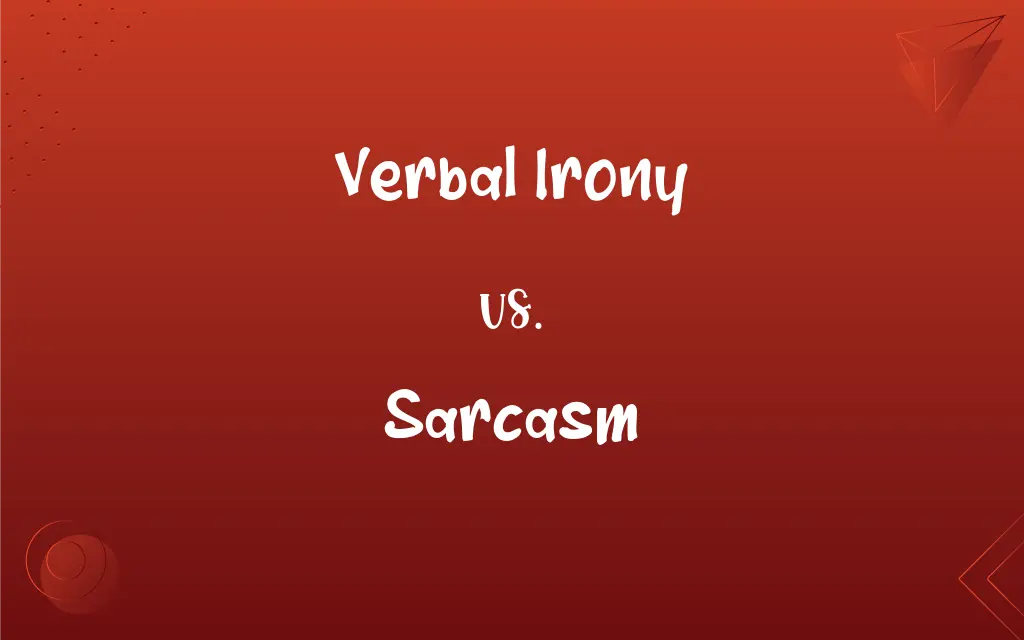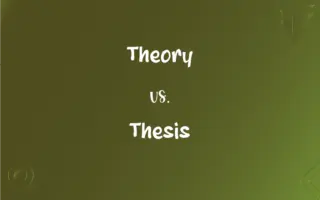Verbal Irony vs. Sarcasm: What's the Difference?
Edited by Aimie Carlson || By Janet White || Published on January 26, 2024
Verbal Irony is saying the opposite of what is meant, subtly, while Sarcasm is often a mocking or contemptuous remark, clearly opposite to what is meant.

Key Differences
Verbal irony involves stating something contrary to what is meant, often subtly. Sarcasm, a form of verbal irony, is used more aggressively, typically to mock or convey contempt.
Verbal irony is often delivered in a neutral or understated tone. Sarcasm, however, is characterized by a biting or sharper tone, indicating scorn or ridicule.
Verbal irony can be used in various contexts, from literary works to everyday conversation, often for humor or reflection. Sarcasm is commonly used in conversation to mock or criticize someone or something directly.
Understanding verbal irony requires recognizing the contrast between words and meaning. Sarcasm is usually more straightforward, often signaled by vocal tone or context.
Verbal irony may not intend to hurt and can be playful. Sarcasm, by contrast, often aims to be cutting or hurtful, used in more antagonistic contexts.
ADVERTISEMENT
Comparison Chart
Definition
Saying the opposite of what is meant subtly
Mocking, contemptuous remarks
Tone
Neutral, understated
Biting, harsh
Usage
Broad, including literature and conversation
Direct mockery or criticism in conversation
Interpretation
Requires recognizing subtlety
Often clear from tone or context
Emotional Impact
Can be playful or reflective
Often hurtful or antagonistic
ADVERTISEMENT
Verbal Irony and Sarcasm Definitions
Verbal Irony
Rhetorical Irony.
Asking 'Isn't this just perfect?' when things go wrong.
Sarcasm
Cutting Remark.
Responding to a mistake with, 'Well, that was brilliant.'
Verbal Irony
Contradictory Statement.
On a rainy day: 'What lovely weather we're having!'
Sarcasm
Scornful Understatement.
After a huge error, saying, 'You did just fine.'
Verbal Irony
Understatement.
Referring to a disaster as 'a bit of a problem.'
Sarcasm
Mocking Praise.
To a poor performance: 'Well, you're obviously a genius.'
Verbal Irony
Dramatic Irony.
Saying 'I trust him completely,' when the audience knows he's a traitor.
Sarcasm
Ridiculing Suggestion.
'Why don't you just solve all our problems?' when someone fails.
Verbal Irony
Overstatement.
Calling a tiny scratch on a car 'a total wreck.'
Sarcasm
A cutting, often ironic remark intended to express contempt or ridicule.
Sarcasm
A form of wit characterized by the use of such remarks
Detected a hint of sarcasm in his voice.
Sarcasm
(uncountable) Use of acerbic language to mock or convey contempt, often using irony and (in speech) often marked by overemphasis and a sneering tone of voice.
Sarcasm
(countable) An act of sarcasm.
Sarcasm
A keen, reproachful expression; a satirical remark uttered with some degree of scorn or contempt; a taunt; a gibe; a cutting jest.
The sarcasms of those critics who imagine our art to be a matter of inspiration.
Sarcasm
Witty language used to convey insults or scorn;
He used sarcasm to upset his opponent
Irony is wasted on the stupid
Satire is a sort of glass, wherein beholders do generally discover everybody's face but their own
Sarcasm
Contemptuous Overstatement.
Calling someone 'the brightest bulb' for a foolish idea.
FAQs
What is verbal irony?
Saying the opposite of what is truly meant, often subtly.
What is an example of verbal irony?
Saying "Great timing!" when someone arrives late.
How is sarcasm different from general irony?
Sarcasm is a more cutting, contemptuous form of irony.
Can sarcasm be constructive?
Rarely, as it's often seen as mocking or belittling.
What skills are required to understand verbal irony?
The ability to recognize contrasts and subtleties in speech.
Does sarcasm depend on the listener's perception?
Yes, how it's received can vary based on the listener's understanding.
Can verbal irony be unintentional?
Yes, it can occur unintentionally in miscommunications.
Is sarcasm always hurtful?
Often, but it can also be playful among friends.
How can one recognize sarcasm?
Through tone of voice, facial expressions, and context.
Why do authors use verbal irony?
To add humor or highlight contrasts in literature.
Can verbal irony be used in writing?
Yes, though it can be harder to convey without vocal tone.
Can verbal irony be positive?
Yes, it can be used for playful teasing or gentle humor.
Is verbal irony always obvious?
No, sometimes it's subtle and easily missed.
How does context affect verbal irony?
Context can completely change the meaning and interpretation.
What are the risks of using sarcasm?
Misunderstanding, offense, and damaging relationships.
Why do people use sarcasm?
For humor, to vent frustration, or to criticize indirectly.
How does one respond to sarcasm?
It varies; one can ignore it, respond sarcastically in turn, or address it directly.
Do all cultures use verbal irony?
It appears in many cultures, but its use and interpretation vary.
Is sarcasm effective in formal communication?
Generally not, as it can be misunderstood or seen as unprofessional.
Can sarcasm be a form of bullying?
Yes, when used to mock or demean others.
About Author
Written by
Janet WhiteJanet White has been an esteemed writer and blogger for Difference Wiki. Holding a Master's degree in Science and Medical Journalism from the prestigious Boston University, she has consistently demonstrated her expertise and passion for her field. When she's not immersed in her work, Janet relishes her time exercising, delving into a good book, and cherishing moments with friends and family.
Edited by
Aimie CarlsonAimie Carlson, holding a master's degree in English literature, is a fervent English language enthusiast. She lends her writing talents to Difference Wiki, a prominent website that specializes in comparisons, offering readers insightful analyses that both captivate and inform.
































































